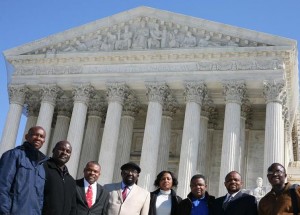By Erica Razook, Amnesty’s Business and Human Rights Group

Members of the Ogoni community outside of the Supreme Court, February 28, 2012. Esther Kiobel, center.
Esther Kiobel is a person.
The bright sunlight that washed the steps of the US Supreme Court on Tuesday did not compete with her radiance, the resolve of a widow, a survivor. Outside the court, her eyes searched unquestionably and steadfastly for justice.
In January 1995, when she visited her husband Barinem in a Nigerian prison to bring him some food, she was stripped, beaten and thrown into a cell herself. In November that year, Barinem was executed alongside eight other activists from the Ogoni region of Nigeria, provoking widespread international condemnation of the country’s military rulers.
